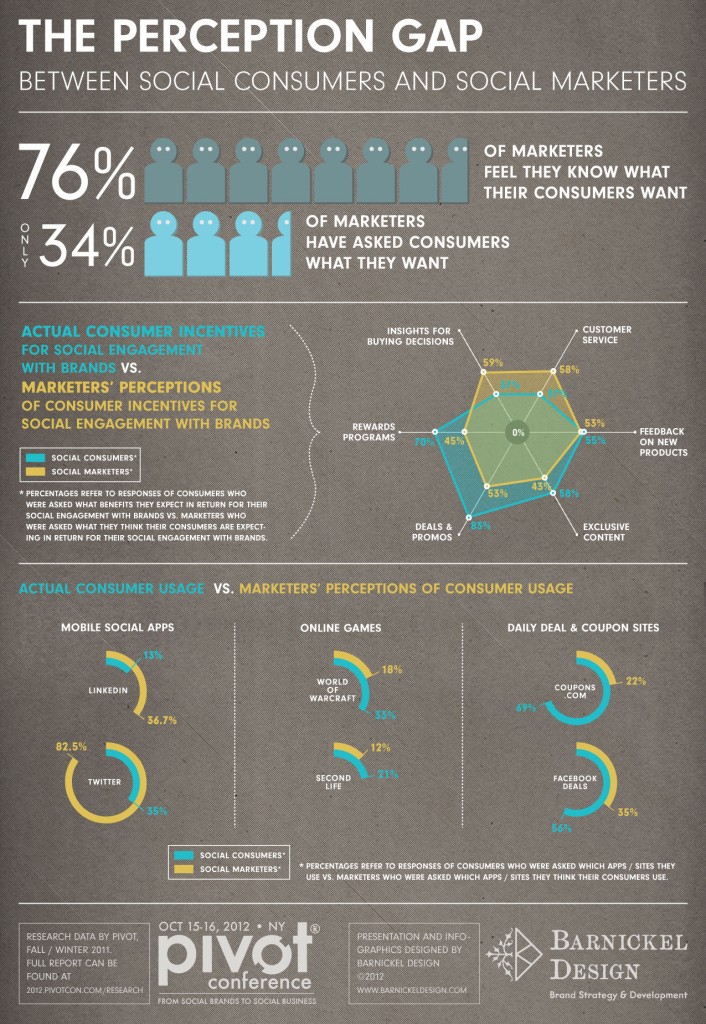 In February of this year, Pivot released a research report that quantified the gap between what consumers actually want versus what executives think consumers want. Brian Solis referred to this as The Perception Gap. He explained this gap as follows:
In February of this year, Pivot released a research report that quantified the gap between what consumers actually want versus what executives think consumers want. Brian Solis referred to this as The Perception Gap. He explained this gap as follows:
“When Social Consumers were asked what they want from Social engagement, their desires were clear: deals, special content and rewards based on their engagement. Customer service ranks dead last in their responses. When Social Marketers were asked the same question, they indicated customer service as the benefit they felt Social Consumers wanted most. Customer needs were well back in the pack of professional presumptions.”
For marketers who work in the trenches each day, these findings are not surprising. How many meetings have you been in with executives who ignore consumer research results and social media feedback or “massaged the data” to make it fit their agendas? In fact, that’s probably one of the biggest challenges that marketers face, particularly in large companies.
Of course, it could be argued that consumers don’t know what they want. A company like Apple and the vision of Steve Jobs certainly demonstrates that rolling out innovative products, which consumers don’t yet know they want, can work very well. In fact, being innovative and first to market is one of the most powerful positions a brand can occupy in the marketplace. Again, this is not new information. At the same time, consumers don’t always respond to market research surveys and focus group sessions the way they really feel. The same is true of social media conversations. Instead of being honest, they say what they think the moderator wants to hear or what they want their social media followers to hear from them.
The best marketers can dive deeper into the research results and the social media conversations to get to the root of consumers’ emotional brand involvement, wants, and needs. That’s a talent that only a minority of marketers actually have, and it’s probably a talent that even fewer corporate executives have. Whether you call it intuition or educated decision-making based on experience, it’s a talent that’s not acknowledged enough.
Whichever type of marketer you are, the data from the Pivot study is something that you should share with your executives. Next time you’re debating what your target audience wants from your brand and the executives at the table are going in the wrong direction, show them the data. It’s always harder to argue with tangible numbers, and what better way to visualize the size of The Perception Gap than with an infographic?
Pivot and Barnickel Design released The Perception Gap Between Social Consumers and Social Marketers infographic shown below earlier this week, which offers many of the most interesting findings from the study. For example, 76% of marketing executives claim that they know what their customers want, but only 34% of them have actually asked their customers what they want from the brand. Furthermore, 83% of consumers want deals from brands, but only 53% of marketing executives think that deals are what their customer want. Social consumers want to engage businesses to share feedback and to receive customer service (59% and 58%, respectively), but only 37% of marketing executives think their customers want these things. Instead, 45% of marketing executives believe that rewards programs are important to their consumers. Not surprisingly, 70% of social consumers do not think that rewards programs are important.
Click on the infographic to view it at full size.
Image: Philip Jackson
Susan Gunelius is the author of 10 marketing, social media, branding, copywriting, and technology books, and she is President & CEO of KeySplash Creative, Inc., a marketing communications company. She also owns Women on Business, an award-wining blog for business women. She is a featured columnist for Entrepreneur.com and Forbes.com, and her marketing-related articles have appeared on websites such as MSNBC.com, BusinessWeek.com, TodayShow.com, and more.
She has over 20 years of experience in the marketing field having spent the first decade of her career directing marketing programs for some of the largest companies in the world, including divisions of AT&T and HSBC. Today, her clients include large and small companies around the world and household brands like Citigroup, Cox Communications, Intuit, and more. Susan is frequently interviewed about marketing and branding by television, radio, print, and online media organizations, and she speaks about these topics at events around the world. You can connect with her on Twitter, Facebook, LinkedIn, or Google+.



